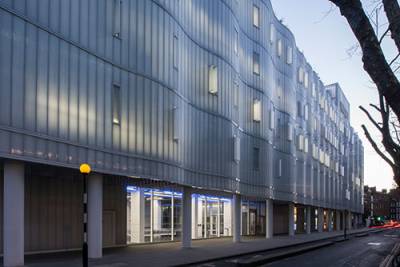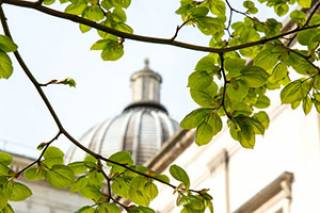Provost's Perspective: Rising to the challenge of sustainability
29 November 2016
Sustainable development is one of the major global themes of the 21st century and one that challenges our economic model of growth and development, the way in which our society functions and our custodianship of the Earth's resources.

Climate change, social inequality, global health and wellbeing, increasing urbanisation, to name but a few, are all significant issues that jolt us to look more closely at the sustainability of our actions - and to pursue change.
But finding a sustainability pathway is not going to be easy, particularly in this period of increasing geopolitical uncertainty. The result of the US elections and subsequent media articles outlining the priorities for the president-elect, highlight the institutional resistance to change.
The president-elect has made it a priority to withdraw the US from the Paris Agreement on climate change, a move that puts greater onus on other nations. There are a few people who are effectively consigning the agreement to the rubbish bin, but there remain many others who are committed to action.
One such person is Christiana Figueres, former Executive Secretary to the UN Framework Convention on Climate Change. I had the honour of introducing her Lancet Lecture at UCL last week and was struck by her hope and determination for the Paris Agreement despite the new president.
She said, "The direction of travel is set…it was set by science, it was set by economics, it was set by technological progress, it was set by morality. If one vehicle on that direction of travel chooses to stop, exit and park on the kerb, putting its yellow lights on, it doesn't change the direction of travel."
This is a reminder that action from all of us is needed if we are to achieve a sustainable future.
The role of UCL in a sustainable society
UCL has an important role to play in driving sustainable development forward. Indeed, I would argue that we are at the forefront of work to address these issues of sustainability through our research, teaching and enterprise activities.
Through research, our institutional strategy, UCL 2034, sets out our commitment both to developing cross-disciplinary solutions to global problems through UCL Grand Challenges, and to initiating collaborative and transformative research through the UCL research domains.
Among other things, UCL has been involved in drafting international climate change reports; we are actively engaged in public policy; and we are regularly publishing papers focused on sustainability issues, including the groundbreaking Lancet Commission on Global Health and Climate Change.
I strongly believe that a UCL education is one that gives our students opportunities to both explore issues of sustainable development and to be involved in the solutions - through experiential learning.
We achieve this through an expansion of work placements and internships; new opportunities to study; volunteering and enterprise projects; and challenging and inspiring interdisciplinary courses, such as the Global Citizenship Programme and the Change Makers programme.
It is through offering these opportunities that we also hope to find young entrepreneurs, such as Arthur Kay, whose bio-bean project reuses ground coffee beans as a biofuel and has gone on to win awards both nationally and internationally.
As much as we are achieving in research and teaching, addressing sustainability is also about leading by example - ensuring that our buildings, operations and services are equally tackling the sustainability challenges.
A challenge for the whole UCL community
Action from the whole UCL community will be essential if we are to achieve a more sustainable future.
The UCL Sustainability team is working with both staff and students to improve both knowledge and engagement with the sustainability agenda. This is not just about reducing our impacts but also making sure that we manage risk and ensure compliance with environmental regulations.
We have Green Champions working within most departments to help drive the sustainability measures forward and there is training provided to those who want to get involved.
And student engagement is thriving whether in the form of vegetable growing at Bentham's Farm to cycle repairs through Dr Bike.
It's encouraging to see so many of you taking part in sustainability initiatives from volunteering to the Student Switch Off campaign, which is run in the UCL halls of residences.
We all have a responsibility to look at what we do and how it can make things more sustainable and I encourage you all to get involved.
Creating a sustainable campus
Our major capital programme presents an unparalleled opportunity to make a sustainable campus that showcases the best of UCL's research on the built environment.
I was extremely pleased to see that the new Sainsbury Wellcome Centre has gained UCL's first BREEAM Excellent award for an academic building and sets the benchmark for other buildings in design or under construction.

UCL is targeting BREEAM Excellent or above for all new buildings and major refurbishments, with the New Student Centre on track to achieve BREEAM Outstanding. What this means in practice is more efficient and healthier buildings; through integrating renewable energy, increasing natural daylight, reducing water and improving internal air quality.
It is not just about our buildings. We are also influencing the way that the sector designs and builds.
In 2015/16, the UCL Sustainability team led the development of a new sector-wide environmental assessment methodology for small refurbishment projects, working alongside the Royal Institute of Chartered Surveyors (RICS) to develop Ska HE.
The scheme, which was launched at UCL in June 2016, focuses on the reuse of materials and raises the bar in other areas such as energy efficiency and occupant wellbeing.
Reducing our carbon emissions

Driving towards a sustainable estate will also help us free up funds for the institution to spend on teaching and research.
Over the past five years, projects such as new boilers and LED lighting have reduced carbon emissions by 2,500 tonnes per year and delivered £1.23 million in avoided cost on UCL's energy bills.
In 2016, UCL Council approved a new Carbon Management Plan, Degrees of Change, which sets an ambitious 15% target for carbon reduction by 2020 and includes longer term targets for the first time, requiring savings of 50% by 2034.
The level of engagement in developing the plan (more than 3,000 people consulted) speaks volumes for the importance of this issue to you all.
And action is leading to improvement: carbon emissions in 2015/16 were 66,438 tonnesCO2e - 2.3% lower than 10 years ago, despite significant growth in both the UCL estate and our activities.
Sustainable operations and services
Work is still underway to drive sustainability and efficiency into UCL's operations. Waste figures indicate an improvement in the level of recycling (up from 59% in 2014/15 to 66% in 2015/16).
Our new logistics programme, has reduced the number of delivery vehicles entering the campus; making a safer and more pleasant environment for staff and students, as well as minimising our impact on local air quality.
The University 'Green' League
As a result of all the work, I was pleased to hear that UCL has retained its 'first class honours' position in the University Green League (overseen by People and Planet), published on Tuesday 22 November.
This is the second year in a row that we have achieved this award and it really is a testament to the UCL community working together.
Next steps
In July this year, the UCL Council decided to amend its approach to ethical investment and to track the Climate Active Endowment Fund, which is being launched soon by our investment advisers Sarasin.
The fund will apply responsible investment criteria in three ways: selective divestment, active engagement (in particular with companies whose activities could significantly impact climate change) and policy outreach (for example, pressing for greater transparency and disclosure).
More widely, we are also going to be reviewing our approach to sustainability over the next year.
Our Sustainability Strategy, which was approved by Council in 2013, will be refreshed with new targets and a focus on three to four big ideas.
Again, I hope you will all take part in the development of the strategy and work with the Sustainability team to help us reduce our impacts as well as continue to develop our own world class reputation in sustainable development.
This is a fantastic opportunity to demonstrate our commitment to addressing real world problems, and I look forward to seeing how the UCL community rises to this challenge.
Professor Michael Arthur, UCL President & Provost
 Close
Close

